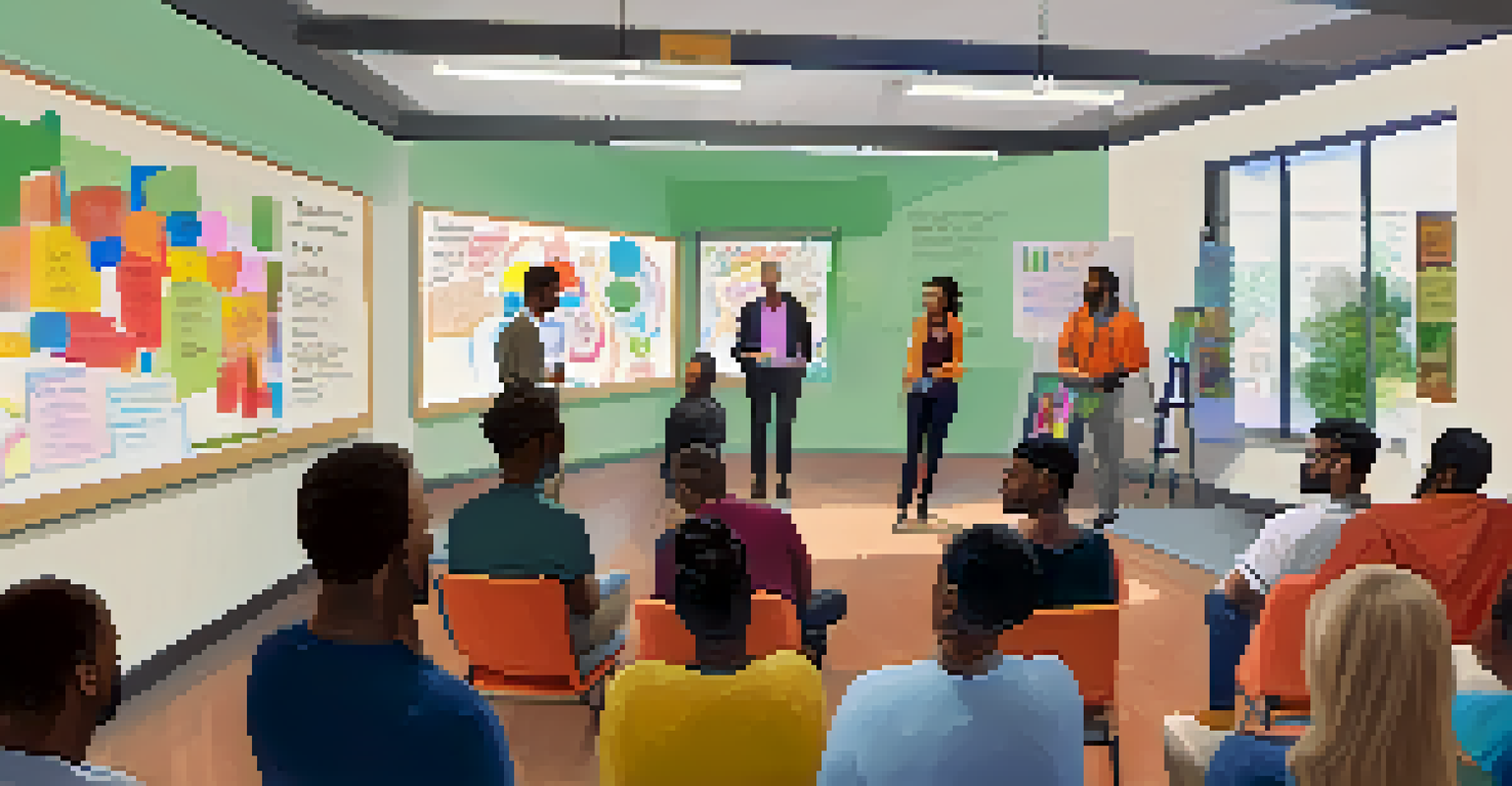Community Initiatives Promoting Mental Health in NYC

Understanding the Importance of Mental Health in Communities
Mental health is an essential component of overall well-being, affecting how individuals think, feel, and act. In urban environments like New York City, the fast pace and diverse population can lead to increased stress and anxiety. Recognizing mental health as a community issue encourages collective responsibility and support, fostering a healthier society.
0Mental health is not a destination, but a process. It's about how you drive, not where you're going.
Community initiatives aimed at promoting mental health can bridge gaps in access to care, especially for marginalized populations. These programs often focus on providing resources, education, and support networks, making mental health care more approachable. When communities prioritize mental health, they create environments where individuals feel safe to seek help without stigma.
By investing in mental health initiatives, cities not only enhance individual well-being but also improve overall community resilience. This can lead to reduced crime rates, improved productivity, and healthier relationships among residents. Understanding this interconnection helps drive the momentum for community-led mental health efforts.
Local Organizations Making a Difference
Numerous organizations in NYC are dedicated to improving mental health through innovative programs. For instance, the NYC Department of Health and Mental Hygiene provides various resources and outreach initiatives designed to educate the public. These organizations often partner with local community centers, schools, and faith-based groups to expand their reach.

Another example is the Mental Health Association of New York City, which offers a plethora of services including advocacy, education, and support groups. They work tirelessly to reduce stigma and promote understanding of mental health issues. Their community-based approach ensures that support is accessible to those who need it the most.
Community Mental Health Matters
Prioritizing mental health as a community issue fosters collective responsibility and support, leading to a healthier society.
These organizations not only provide crucial services but also empower individuals to take charge of their mental health. By creating supportive environments and fostering open conversations, they help destigmatize mental health challenges and encourage people to seek help when needed.
Peer Support Networks: Building Community Resilience
Peer support networks have emerged as vital resources for mental health in NYC. These networks connect individuals who have faced similar challenges, creating a sense of belonging and understanding. By sharing experiences, participants can find solace and gain practical coping strategies from one another.
The greatest weapon against stress is our ability to choose one thought over another.
Organizations like the National Alliance on Mental Illness (NAMI) New York City provide structured peer support programs, facilitating meetings and workshops. These initiatives enable members to discuss their journeys in a safe space, ultimately fostering empowerment and recovery. The shared experience can be incredibly validating, reminding individuals they are not alone.
The beauty of peer support lies in its relatability; participants often feel more comfortable opening up to someone who has walked a similar path. This sense of community can be a powerful tool in navigating mental health challenges, reinforcing the idea that recovery is possible with support.
Mindfulness and Wellness Initiatives in NYC
Mindfulness practices are gaining traction as effective tools for mental health promotion. Many NYC-based organizations offer workshops and classes that teach techniques such as meditation, yoga, and breathing exercises. These practices help participants reduce stress, build resilience, and improve emotional regulation.
For example, organizations like The Center for Mindfulness in New York City provide resources for individuals looking to incorporate mindfulness into their daily routines. These programs often emphasize the importance of being present and aware, which can significantly impact overall mental health. Participants report feeling calmer and more in control of their emotions after engaging in these practices.
Youth Programs Build Resilience
Investing in youth mental health initiatives equips young people with essential tools to manage stress and emotional challenges.
By integrating mindfulness into community health initiatives, NYC is taking a proactive approach to mental wellness. As more people embrace these strategies, the collective impact on community mental health can be profound, promoting a culture of self-care and emotional awareness.
Youth Programs: Shaping the Future of Mental Health
Investing in youth mental health is crucial for building a healthier future. NYC offers various programs targeting young people, such as counseling services in schools and after-school workshops. These initiatives aim to equip youth with the tools they need to manage stress and navigate the complexities of growing up.
Organizations like the New York State Office of Mental Health have launched programs specifically designed for children and adolescents. These programs focus on skill-building, resilience, and emotional intelligence, helping young people develop healthy coping mechanisms. This early intervention can prevent more serious mental health issues later in life.
By prioritizing mental health education among youth, NYC is fostering a generation that values emotional well-being. These initiatives not only benefit individual participants but also contribute to a more informed and compassionate community overall.
Cultural Competence in Mental Health Services
Cultural competence in mental health services is essential in a diverse city like NYC. Community initiatives increasingly recognize the importance of tailoring mental health support to various cultural backgrounds. By understanding unique experiences and perspectives, providers can offer more effective and relatable care.
Organizations such as the Asian American Federation focus on addressing mental health issues within diverse cultural contexts. They provide culturally relevant resources and training for mental health professionals, ensuring that services meet the needs of all community members. This approach helps break down barriers and fosters trust between providers and clients.
Advocacy Drives Policy Change
Advocacy organizations play a crucial role in shaping mental health policies, ensuring equitable access to resources for all.
When mental health services are culturally competent, individuals are more likely to seek help and engage in treatment. This not only improves individual outcomes but also strengthens community ties, making it essential for NYC's mental health landscape.
Advocacy and Policy Change for Mental Health
Advocacy plays a pivotal role in shaping mental health policies in NYC. Numerous organizations work tirelessly to influence legislation and secure funding for mental health initiatives. By raising awareness about the importance of mental health, they help ensure that it remains a priority on the city's agenda.
Groups like the New York City Mental Health Coalition advocate for equitable access to mental health services and challenge systemic barriers. Their efforts not only highlight the pressing need for reform but also empower communities to demand change. Engaging the public in these conversations is crucial for driving policy improvements.

Through advocacy, NYC can create an environment where mental health resources are accessible to all. By pushing for systemic change, these organizations work towards a future where mental health is treated with the urgency and care it deserves.